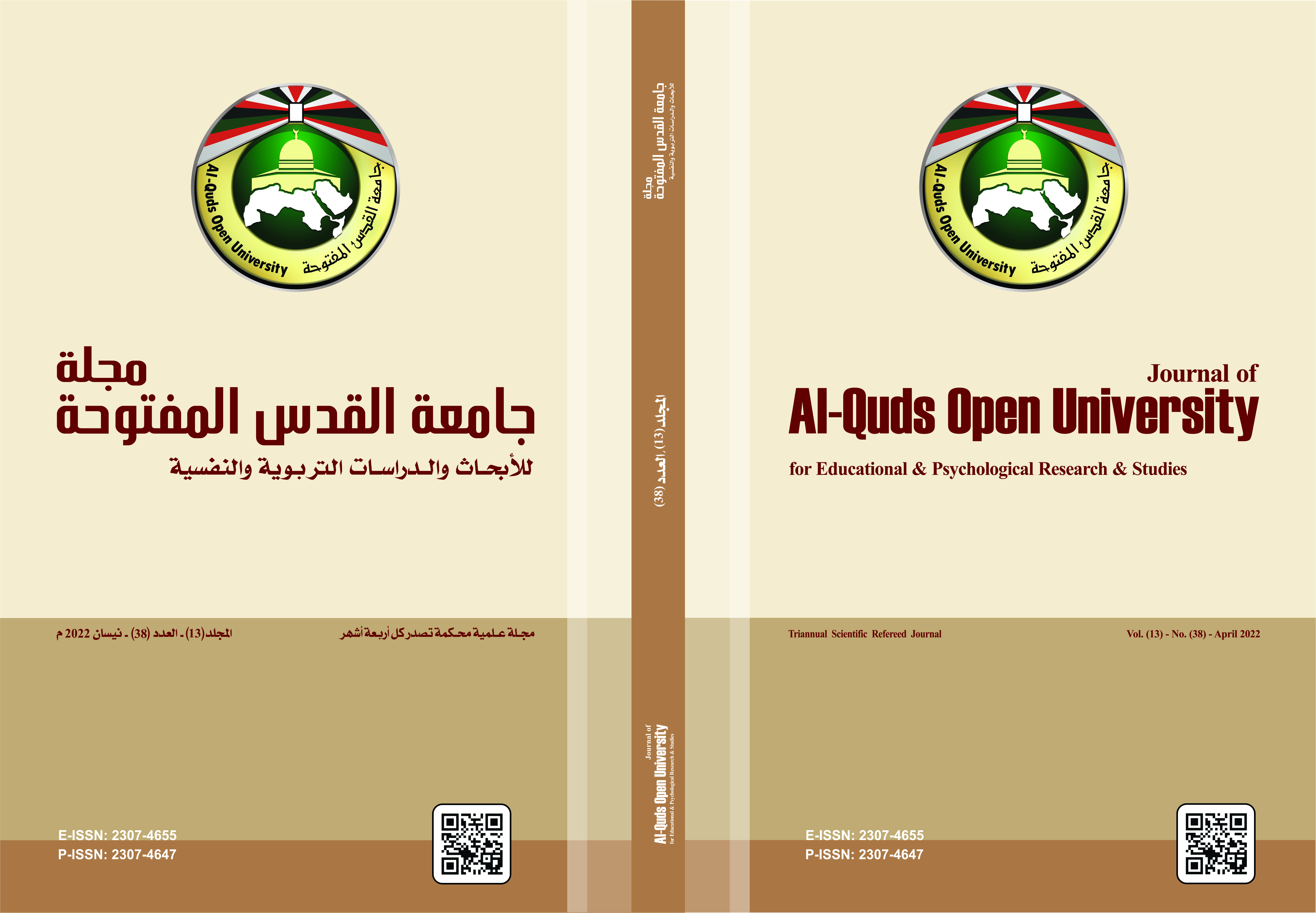The Effectiveness of Scientific Analogies Strategy in Developing Health Awareness of Corona Virus and Reflective Thinking in Science Subject Among 9th Grade Female Students in Khan Yunis Governorate
DOI:
https://doi.org/10.33977/1182-013-038-010Keywords:
Scientific Analogies, health awareness, reflective thinkingAbstract
This study aims at studying the effectiveness of faith similes strategy in developing health awareness of COVID - 19 virus and reflective thinking among 9th grade female students in Khan Yunis. The researchers follow the experimental approach and apply the two - group design with pre and post - applications. The study sample consists of 37 female students of 9th grade from two schools in Khan Yunis for the year 2020 - 2021. Moreover, the sample consists of two groups: The experimental group, which includes 15 female students from Fatima al Zahra Model School for Girls to study the strategy of Scientific Analogies and the control group, which includes 22 female students from Sheikh Hamad bin Khalifa al - Thani Secondary School for Girls to study the regular teaching strategy. The test entails 38 multiple choices distributed into six areas: Visual reading, detecting fallacies, the main cause of the problem, giving convincing explanations, reaching conclusions, and providing suggested solutions. The researchers designed a health awareness test, which includes 21 questions divided into three areas: Recognition of the virus, its accompanying symptoms, and methods of prevention. Furthermore, the researchers develop a teacher guide on employing faith similes and verify its validity, stability, and distinction using appropriate procedures. Finally, the results prove the effectiveness of faith similes strategy in developing health awareness of COVID - 19 virus and reflective thinking among 9th grade female students.
References
الأطرش، طارق(2016). فاعلية برنامج مقترح قائم على الذكاءات المتعددة في تنمية مهارات التفكير التأملي والتواصل الرياضي لدى طلاب الصف التاسع الأساسي بغزة، رسالة ماجستير غير منشورة، الجامعة الإسلامية، غزة.
الأغا، إيمان(2017). أثر استخدام استراتيجية المتشابهات في اكتساب المفاهيم العلمية والاحتفاظ بها لدى طالبات الصف التاسع الأساسي بغزة. رسالة ماجستير منشورة، الجامعة الإسلامية، غزة.
أمبو سعيدي، عبد الله والبلوشي، سليمان (2009). طرائق تدريس العلوم مفاهيم وتطبيقات عملية، عمان: دار المسيرة.
بوقحوص، خالد(2017). علاقة التفكير التأملي بالأداء التدريسي لدى الطلبة المعلمين تخصص علوم ورياضيات. المجلة الدولية للبحوث التربوية، 41(1)، 39-65
الجعفر، علي (2016). استراتيجية مقترحة لاستخدام التشبيهات القائمة في البيئة المحلية في تعليم الحروف الهجائية لأطفال الروضة والمرحلة الابتدائية. مجلة الدراسات التربوية والنفسية ،10(3) 596- 615
جمعة، ضحى (2016). أثر توظيف نموذج درايفر في تنمية مهارات التفكير التأملي والاستطلاع العلمي في مادة العلوم لدى طالبات الصف التاسع الأساسي، رسالة ماجستير منشورة الجامعة الإسلامية، غزة
الجمل، توكل محمد (2016). فاعلية الرحلات المعرفية عبر الويب في الاستيعاب المفاهيمي وتنمية مهارات التفكير التأملي من خلال مادة الفقه لدى طلاب المرحلة الثانوية الأزهرية. دراسات عربية في التربية وعلم النفس، (77)197-245
الحطيني، إبراهيم(2019). درجة مستوى الوعي الصحي لدى طالبات كليات المجتمع في جامعة شقراء بالمملكة العربية السعودية. مجلة العلوم التربوية والنفسية ،3(25) 113-136
الحلبي، سماح(2017). دور الإدارة المدرسية في تنمية الوعي الصحي لدى طلبتها بمدارس وكالة الغوث الدولية بمحافظات غزة وسبل تفعيله. رسالة ماجستير غير منشورة، الجامعة الإسلامية، غزة
الخاجة ، مي (2016). الإعلام الصحي في دولة الإمارات من المنظورين الأكاديمي والطبي، مجلة جامعة الشارقة للعلوم الإنسانية والاجتماعية،15(2)، 98-133
زيتون، عايش (2007). النظرية البنائية واستراتيجيات تدريس العلوم، دار النشر: عمان.
زيتون، عايش(2010). الاتجاهات العالمية المعاصرة في مناهج العلوم وتدريسها، دار الشروق والتوزيع، عمان
Downloads
Published
How to Cite
Issue
Section
License
- The editorial board confirms its commitment to the intellectual property rights
- Researchers also have to commit to the intellectual property rights.
- The research copyrights and publication are owned by the Journal once the researcher is notified about the approval of the paper. The scientific materials published or approved for publishing in the Journal should not be republished unless a written acknowledgment is obtained by the Deanship of Scientific Research.
- Research papers should not be published or republished unless a written acknowledgement is obtained from the Deanship of Scientific Research.
- The researcher has the right to accredit the research to himself, and to place his name on all the copies, editions and volumes published.
- The author has the right to request the accreditation of the published papers to himself.







2.png)






_2.png)

